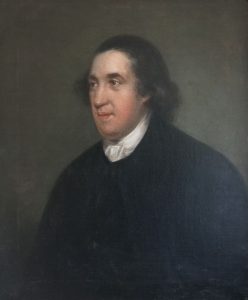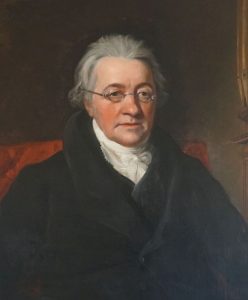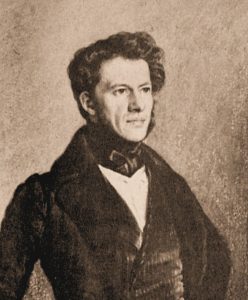Members of the La Trobe family were friends of William Wilberforce, the English Member of Parliament who had devoted himself and his considerable financial resources to the cause of the abolition of the slave trade and of slavery itself.
The La Trobe family, like all Moravians, were governed by the church’s rule of non-interference in public affairs, an enduring fundamental of their faith, especially in their missionary work. The principles of the La Trobe family were totally aligned with those of Wilberforce. They were philosophically committed to the abolition of slavery and the slave trade but, as Moravians, they were restrained by the rules of their church from becoming active social reformers.
 Benjamin La Trobe, Charles Joseph La Trobe’s grandfather and Secretary to the Moravian Society for the Furtherance of the Gospel, was the guest of Rev James Ramsay, the Vicar of Teston (pronounced Teeson) and Nettlestead, on an extended visit to Kent in 1786. The Vicar, a former naval surgeon who had spent time in the West Indies where he observed the depravity of the slave trade, was a colleague of William Wilberforce and his coterie, the Teston Evangelicals ,who planned and worked assiduously to effect the abolition of slavery. This group was the forerunner of the more prominent Clapham Sect in advancing the antislavery cause. Benjamin La Trobe visited Charles Middleton, 1st Baron Barham, of nearby Barham Court, who played a pivotal role in the abolition of slavery through his support of Wilberforce and his fellow campaigners.
Benjamin La Trobe, Charles Joseph La Trobe’s grandfather and Secretary to the Moravian Society for the Furtherance of the Gospel, was the guest of Rev James Ramsay, the Vicar of Teston (pronounced Teeson) and Nettlestead, on an extended visit to Kent in 1786. The Vicar, a former naval surgeon who had spent time in the West Indies where he observed the depravity of the slave trade, was a colleague of William Wilberforce and his coterie, the Teston Evangelicals ,who planned and worked assiduously to effect the abolition of slavery. This group was the forerunner of the more prominent Clapham Sect in advancing the antislavery cause. Benjamin La Trobe visited Charles Middleton, 1st Baron Barham, of nearby Barham Court, who played a pivotal role in the abolition of slavery through his support of Wilberforce and his fellow campaigners.
 Christian Ignatius La Trobe, Secretary of the Moravian Missions, was like his father Benjamin,personally opposed to the slave trade. He knew many influential people in the various evangelical groups and among those working for social reform, including Lord and Lady Barham at whose home in Kent he encountered William Wilberforce and his group of intellectuals who were committed to the abolition of slavery. Wilberforce called upon him in1786 to discuss the abolition of the slave trade, and although he prepared a paper for the government enquiry the Moravians’ rule against meddling in politics meant that Christian Ignatius could not formerly ally himself to the cause of abolition.
Christian Ignatius La Trobe, Secretary of the Moravian Missions, was like his father Benjamin,personally opposed to the slave trade. He knew many influential people in the various evangelical groups and among those working for social reform, including Lord and Lady Barham at whose home in Kent he encountered William Wilberforce and his group of intellectuals who were committed to the abolition of slavery. Wilberforce called upon him in1786 to discuss the abolition of the slave trade, and although he prepared a paper for the government enquiry the Moravians’ rule against meddling in politics meant that Christian Ignatius could not formerly ally himself to the cause of abolition.
 Charles Joseph La Trobe’s first Colonial Office posting was in 1837 when he was sent to the British West Indies to inspect the schools for which the many religious bodies had received parliamentary financial grants in 1835-36. His role was to report to the Colonial Office on the progress that had been made to educate the 776,000 recently liberated slaves. La Trobe was convinced that education was key to the former slaves’ real freedom. This message was strongly stated in his three well-received detailed reports to the British government, tabled in the House of Commons between February 1838 and February 1839, which provided the necessary foundations for future action in West Indian education.
Charles Joseph La Trobe’s first Colonial Office posting was in 1837 when he was sent to the British West Indies to inspect the schools for which the many religious bodies had received parliamentary financial grants in 1835-36. His role was to report to the Colonial Office on the progress that had been made to educate the 776,000 recently liberated slaves. La Trobe was convinced that education was key to the former slaves’ real freedom. This message was strongly stated in his three well-received detailed reports to the British government, tabled in the House of Commons between February 1838 and February 1839, which provided the necessary foundations for future action in West Indian education.
